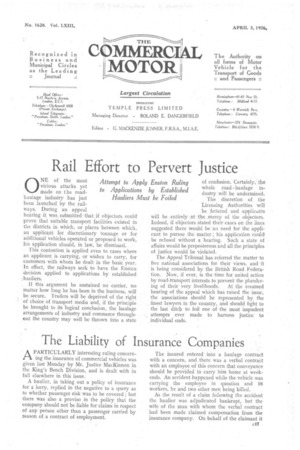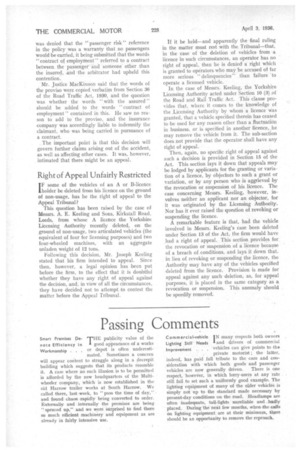The Liability of Insurance Companies
Page 39

Page 40

If you've noticed an error in this article please click here to report it so we can fix it.
A PARTICULARLY interesting ruling concern/A ing the insurance of commercial vehicles was given last Monday by Mr. Justice MacKinnon in the King's Bench Division, and is dealt with in full elsewhere in this issue.
A haulier, in taking out a policy of insurance for a lorry, replied in the negative to a query as to whether passenger risk was to be covered ; but there was also a proviso in the policy that the company should not be liable for claims in respect of any person other than a passenger carried by reason of a contract of employment. The insured entered into a haulage contract with a concern, and there was a verbal contract with an employee of this concern that conveyance should be provided to carry him home at weekends. An accident happened while the vehicle was carrying the employee in question and 16 workers, he and two other men being killed.
As the result of a claim following the accident the haulier was adjudicated bankrupt, but the wife of the man with whom the verbal contract had been made claimed compensation from the insurance company. On behalf of the claimant it was denied that the "passenger risk" reference in the policy was a warranty that no passengers would be carried, it being submitted that the words " contract of employment" referred to a contract between the passenger and someone other than the insured, -and the arbitrator had upheld this contention.
Mr. Justice MacKinnon said that the words of the proviso were copied verbatim from Section 36 of the Road Traffic Act, 1930, and the question was whether the words "with the assured" should be added to the words " contract of employment" contained in this. He saw no reason to add to the proviso, and the insurance company was accordingly liable to indemnify the claimant, who was being carried in pursuance of a contract.
The important point is that this decision will govern further claims arising out of the accident, as well as affecting other cases. It was, however, intimated that there might be an appeal.
Right of Appeal Unfairly Restricted
IF some of the vehicles of an A or B-licence holder be deleted from his licence on the ground of non-usage, has he the right of appeal to the Appeal Tribunal?
This question has been raised by the case of Messrs. A. E. Keeling and Sons, Kirkstall Road, Leeds, from whose A licence the Yorkshire Licensing Authority recently deleted, on the ground of non-usage, two articulated vehicles (the equivalent of four for licensing purposes) and two four-wheeled machines, with an aggregate unladen weight of 12 tons.
Following this decision, Mr. Joseph Keeling stated that his firm intended to appeal. Since then, however, a legal opinion has been put before the firm, to the effect that it is doubtful whether they have any right of appeal against the decision, and, in view of all the circumstances, they have decided not to attempt. to contest the matter before the Appeal Tribunal. If it be held—and apparently the final ruling in the matter must rest with the Tribunal—that, in the case of the deletion of vehicles from a licence in such circumstances, an operator has no right of appeal, then he is denied a right which is granted to operators.who may be accused of far more serious " delinquencies " than failure ' to operate a licensed vehicle.
In the case of Messrs. Keeling, the Yorkshire Licensing Authority acted under Section 10 (3) of the Road and Rail Traffic Act. This clause provides that, where it comes to the knowledge of the .Licensing Authority by whom a licence was granted, that a vehicle specified therein has ceased to be used for any reason other than a fluctuatiOn in business, or is specified in another licence, he may remove the vehicle from it. The sub-section does not provide that the operator shall have any right of appeal. Then, again, no specific right of appeal against such a decision is provided in Section 15 of the Act. This section lays it down that appeals may be lodged by applicants for the granting or variation of a licence, by objectors to such a grant or variation, or by any person who is aggrieved by the revocation or suspension of his licence. The case concerning Messrs. Keeling, however, involves neither an applicant nor an objector, for it was originated by the Licensing Authority. Nor has it ever raised the question of revoking or suspending the licence.
A remarkable feature is that, had the vehicle involved in Messrs. Keeling's case been deleted under Section 13 of the Act, the firm would have had a right of appeal. This section provides for the revocation or suspension of a licence because of a breach of conditions, and lays it down that, in lieu of revoking or suspending the licence, the Authority may have any of the vehicles specified deleted from the licence. Provision is made for appeal against any such deletion, as, for appeal purposes, it is placed in the same category as a revocation or suspension. This anomaly should be speedily removed.












































































































